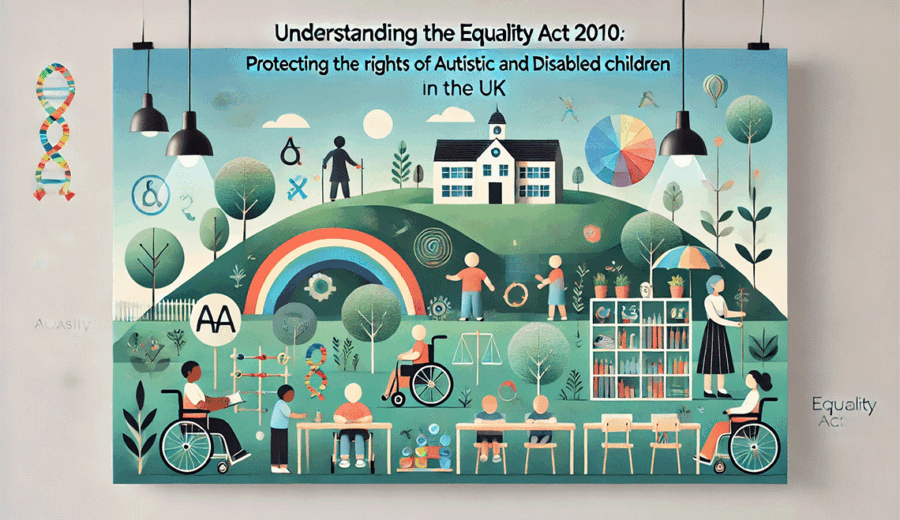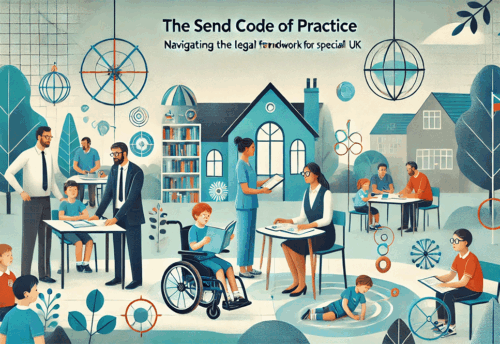
Understanding the Equality Act 2010
Understanding the Equality Act 2010: Protecting the Rights of Autistic and Disabled Children
The Equality Act 2010 is a transformative law in the United Kingdom designed to safeguard the rights of individuals with disabilities, including autistic children. By addressing discrimination and promoting equality, the Act ensures that autistic and disabled children have the same opportunities as their peers in education, healthcare, public spaces, and beyond.
Key Provisions of the Equality Act 2010
1. Definition of Disability
Under the Equality Act, a person is considered disabled if they have a physical or mental impairment that has a substantial and long-term negative impact on their ability to perform everyday activities. Autism is explicitly recognized as a disability under this law, meaning children on the spectrum are protected.
2. Types of Discrimination Prohibited
The Act identifies and prohibits several forms of discrimination, ensuring equal treatment and access for disabled children:
- Direct Discrimination: Treating a child unfavorably solely because of their disability.
Example: Refusing to enroll a child in a school because they are autistic. - Indirect Discrimination: Implementing policies or rules that disadvantage disabled children disproportionately.
Example: A school requiring all children to sit exams in the same format, without accommodations for autistic children. - Discrimination Arising from Disability: Treating a child unfairly due to behaviors or needs linked to their disability.
Example: Punishing a child for behaviors related to sensory overload without addressing the cause. - Harassment: Subjecting a child to unwanted behavior that violates their dignity or creates an intimidating environment.
Example: Allowing bullying of a disabled child to go unchecked. - Victimization: Penalizing someone for raising a complaint or asserting their rights under the Act.
Example: Retaliating against a parent who requests reasonable adjustments for their child.
3. Reasonable Adjustments
The Equality Act requires public institutions, schools, and service providers to make “reasonable adjustments” to remove barriers faced by disabled individuals. For autistic children, this could mean:
- Modifying classroom environments to reduce sensory overload.
- Offering alternative communication methods, such as visual aids or communication devices.
- Allowing flexibility in school rules, like uniform policies or exam arrangements.
- Ensuring physical accessibility to facilities.
Impact on Education
The Equality Act 2010 plays a critical role in ensuring children with autism and disabilities have access to inclusive education. Key implications include:
- Inclusive Education Policies
Schools must accommodate children with SEND (Special Educational Needs and Disabilities) through individualized support plans, classroom modifications, and access to specialist staff. - Protection Against Exclusion
Schools are prohibited from excluding children for behaviors linked to their disabilities without providing adequate support or exploring alternatives. - Equal Access to Extracurricular Activities
Children with disabilities must have the same opportunities to participate in trips, clubs, and events, with reasonable adjustments made as needed.
Parental Advocacy and Rights
Parents of autistic and disabled children are empowered by the Equality Act to demand equal treatment for their children. Key rights include:
- Requesting Reasonable Adjustments: Parents can request specific accommodations in schools, healthcare settings, and public services.
- Challenging Discrimination: If a child faces unfair treatment, parents can file a complaint with the institution or take legal action.
- Ensuring Accountability: Public bodies, including local councils, are legally obligated to comply with the Act.
Support Available Under the Equality Act
1. Educational Support
- Education, Health, and Care Plans (EHCPs): These legally binding documents outline the specific needs of a disabled child and the support they require. Parents can request EHCP assessments through their local authority.
- SEND Support in Schools: Mainstream and special schools must follow the SEND Code of Practice, ensuring tailored support for each child.
2. Financial Support
- Disability Living Allowance (DLA): Provides financial aid for children with disabilities to cover extra costs related to their care.
- Personal Independence Payment (PIP): Available for older children transitioning into adulthood.
3. Social Care Services
- Respite Care: Families can access short-term care services to provide relief to parents or caregivers.
- Social Work Support: Local authorities must provide assistance to ensure the well-being of disabled children.
4. Public Awareness and Advocacy
Organizations like the National Autistic Society and local advocacy groups help parents understand their rights and advocate for necessary changes in schools and communities.
How to Seek Help if Discrimination Occurs
Parents who believe their child has been discriminated against can:
- File a formal complaint with the institution involved (e.g., school, council).
- Contact the Equality Advisory and Support Service (EASS) for free guidance.
- Consider legal action through a SEND tribunal or court if complaints are unresolved.
- Seek support from charities specializing in SEND advocacy.





Leave a Reply